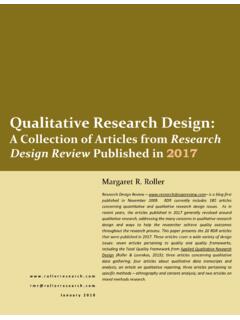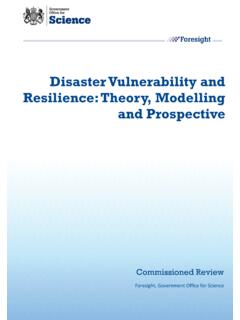Transcription of Reflexivity and Researcher Positionality.
1 Newcastle University ePrints - Corlett S, Mavin S. Reflexivity and Researcher Positionality. In: Cassell C; Cunliffe A; Grandy G, ed. The Sage Handbook of Qualitative Business and Management Research Methods. London: Sage, 2018, Copyright: This is the authors accepted manuscript of a chapter that has been published in its final definitive form by Sage, 2018. Link to volume: Date deposited: 11/11/2017 Embargo release date: 02 January 2020 PRE-PUBLICATION VERSION Sandra Corlett and Sharon Mavin Chapter 23 in the Handbook of Qualitative Research in Business and Management, Sage. Forthcoming 2018 Reflexivity and Researcher Positionality Abstract This chapter explores Reflexivity as a set of mutually interrelated processes and practices involving the reflexive thinking, doing, and evaluating of qualitative research.
2 The chapter provides insights into debates surrounding the theory and practice of Reflexivity and argues these are underpinned by the Researcher s epistemological assumptions. Such epistemological assumptions influence the Researcher s positionality on issues relating to representation and truth, to the Researcher s role and power relations with others, and to criteria for evaluating qualitative research. Along with other chapters in Section Three: The Researcher , the chapter embraces the reflexive Researcher as an integral aspect of qualitative research and highlights challenges involved in reflexive research practice. We also present practical guidance for critical self- Reflexivity , practised as an individual and/or collective endeavour, through a series of thought-provoking questions and examples from our own and others research in qualitative business and management research.
3 Through the chapter we encourage readers to see the value of Reflexivity in its ability to bring epistemological, methodological and criteriological challenges to the forefront as a means of acknowledging how, through our Researcher positionality and as qualitative researchers, we influence the research we do and shape the knowledge we produce. Keywords Reflexivity , Researcher positionality, self- Reflexivity , theory and practice of Reflexivity , epistemological assumptions, Researcher role, reflexive research, collective Reflexivity , qualitative research challenges Biographical details Sandra Corlett is a Principal Lecturer in Organisation and Human Resource Management at Newcastle Business School, Northumbria University, in Newcastle, UK, and Chair of the British Academy of Management s Special Interest Group on Identity.
4 Her research interests are in identity, vulnerability, manager and follower learning and development, and qualitative research methods. Her work has been published in Gender in Management: An International Journal, Journal of Business Ethics, Management Learning, and Scandinavian Journal of Management. Sandra is co-editor of a Special Issue on Identity, in International Journal of Management Reviews, and co-editor of a Routledge Studies in HRD text entitled Identity as a Foundation for Human Resource Development. [Email: ]. Sharon Mavin is Professor and Director of Roehampton Business School, University of Roehampton, London, UK, a Fellow of the British Academy of Management, Chair of the University Forum of Human Resource Development, co-Editor of Gender in Management: An International Journal and an Associate Editor of International Journal of Management Reviews.
5 Her research interests are in women s relationships with other women, female misogyny, doing gender, identity, vulnerability, and leadership. She has published in journals such as British Journal of Management, Organization, International Journal of Management Reviews, Gender, Work and Organization, Qualitative Research in Organizations and Management: An International Journal, and Gender and Management: An International Journal. [Email: Chapter 23: Reflexivity and Researcher Positionality Introduction Reflexivity is considered an integral aspect of qualitative research. It involves us, as researchers, understanding how processes of doing research shape its outcomes (Hardy et al.)]
6 , 2001), reflecting upon the ways in which we carry out our empirical research projects, and explaining to an audience how we move through research manufacturing processes to certain conclusions. Reflection and Reflexivity are sometimes used synonymously but Alvesson and Sk ldberg (2009: 8) distinguish between them, conceiving reflexive empirical research .. as a particular, specified version of reflective research, involving reflection on several levels or directed at several themes . Hibbert et al. (2010: 48) go further and understand Reflexivity as related to, but qualitatively different from , reflection. For them, whilst reflection might enable researchers to observe research practice, as it might be reflected back to them from a mirror image, Reflexivity involves exposing or questioning our ways of doing (Hibbert et al.
7 , 2010: 48). Therefore, Reflexivity has a self-referential characteristic of bending-back some thought upon the self, such that it takes the form of subject-object-subject (Archer, 2009: 2) and also a recursive dimension where, through questioning the bases of our interpretations, Reflexivity brings about change in the process of reflection (Hibbert et al., 2010: 48). For us, therefore, Reflexivity is always a self-monitoring of, and a self-responding to, our thoughts, feelings and actions as we engage in research projects. In the following chapter we outline understandings of Reflexivity , as practices of appreciating our own Researcher positionality in relation to questions about; what kind of knowledge is possible our epistemology; the doing of research and our relations with research participants and others and; evaluating qualitative management research.
8 We acknowledge Reflexivity as ambiguous and complex and consider how processes of Reflexivity address Researcher positionality, identity and power in research. We briefly offer practical examples of doing Reflexivity in management research to highlight how researchers might consider processes of Reflexivity in their own qualitative management research and discuss collective Reflexivity , involving research co-producers and users, as areas for future development in reflexive practice. We conclude by summarizing our discussions in the chapter and offering our authorial identity (Alvesson et al., 2008: 483) reflections on the chapter we have produced.
9 Reflexivity : different understandings, different practices Reflexivity is variously conceived and has different implications for qualitative research practice and outcomes, dependent on the underlying ontological and epistemological orientations of the Researcher (Day, 2012; Johnson and Duberley, 2000). For instance, in the context of discussing shifts from modern to postmodern understandings of doing qualitative research, Pillow (2003: 180) states that Reflexivity as a methodological practice is dependent on a subject or subjects to reflect on and how the subject is thought is key then to how Reflexivity is practiced . For example, a Researcher coming from a modernist understanding of self as singular and knowable will position the purposes and practices of Reflexivity quite differently to someone with a postmodern understanding of self as multiple and unknowable (Pillow, 2003).
10 For instance, a Researcher with a modernist approach might argue that self-reflexive practices enable the Researcher to truly know her/his self and, thus, to provide a true account of how her/his subjectivity impacted the research process, whereas a postmodernist Researcher might acknowledge the challenges of engaging in self-reflexive practices and qualify self-knowledge as partial and any research process account as limited (Pillow, 2003). Notwithstanding its different understandings and practices, Reflexivity is generally understood as giving attention to the complex relationship between processes of knowledge production and the various contexts of such processes, as well as the involvement of the knowledge producer (Alvesson and Sk ldberg, 2009: 8).


